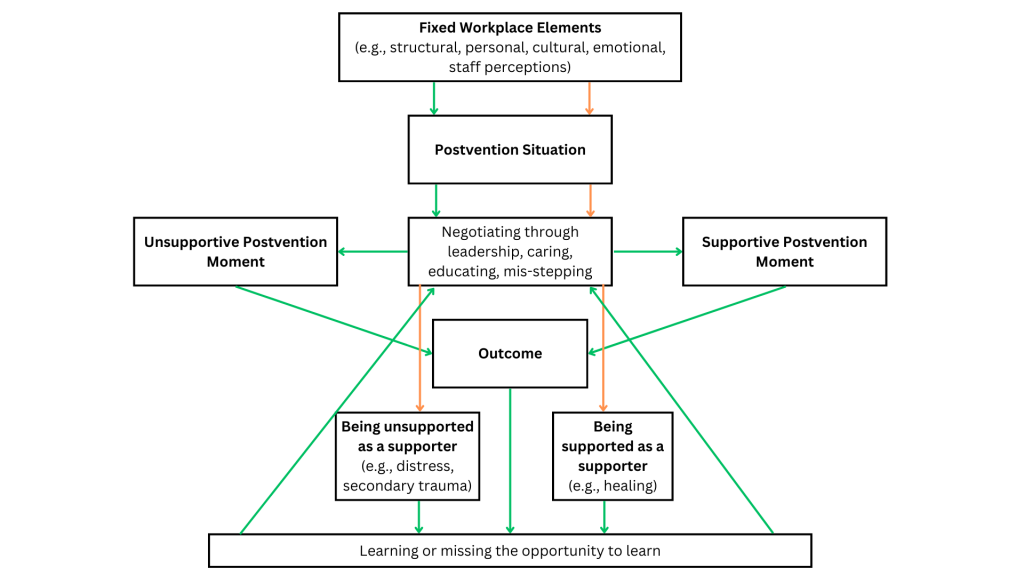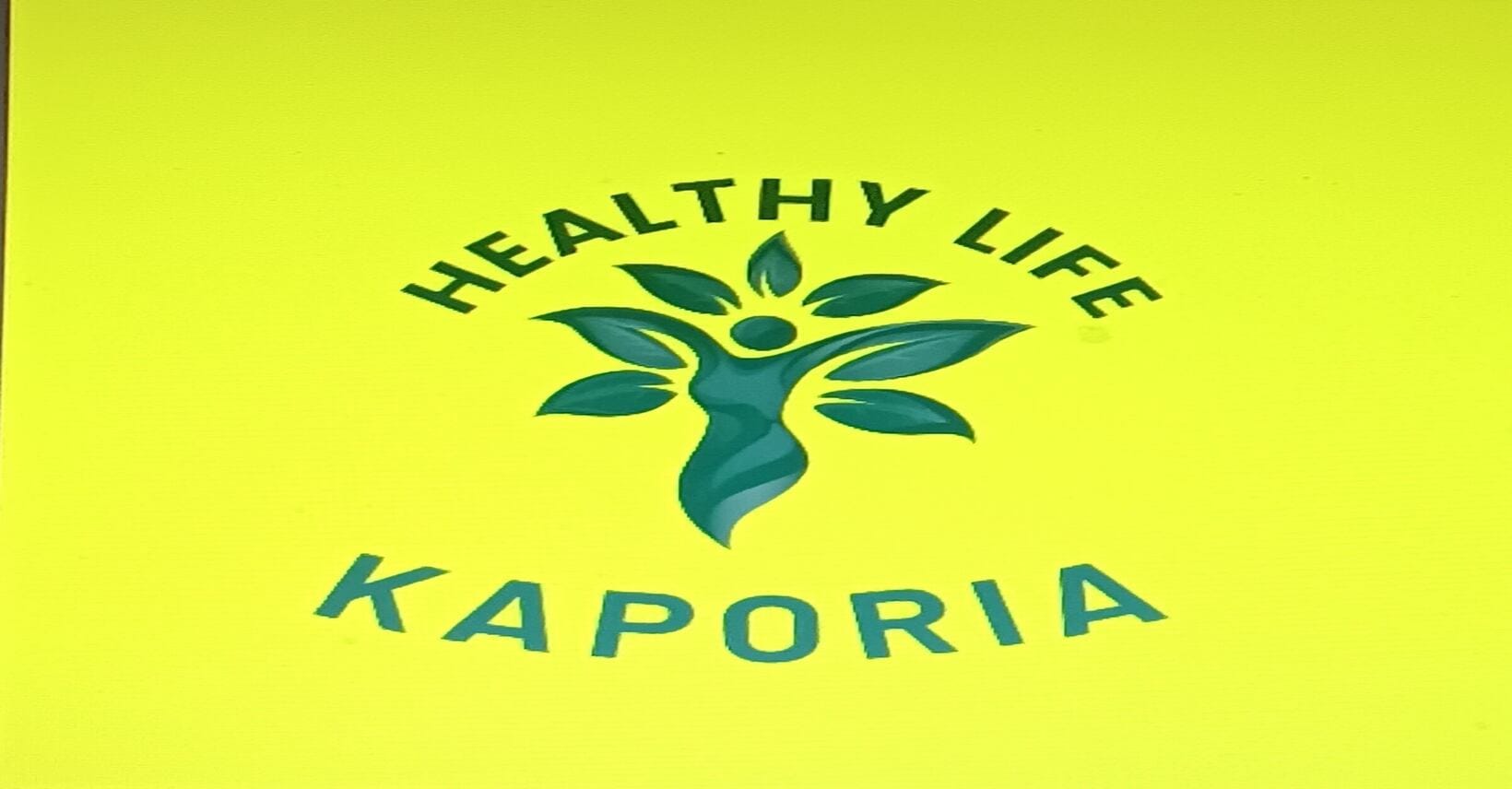[ad_1]
Greater than 5,ooo suicides had been registered in England alone again in 2022 (Samaritans, n.d.). That’s greater than 14 individuals each day of the yr in England who took their very own lives. Every with their very own particular person tragic story. What’s extra, that is the variety of registered suicides, so the precise quantity of people that died by suicide is prone to be greater.
It’s mentioned that healthcare employees are at a better danger of suicide than every other career (NHS Employers, 2024), doubtlessly because of the long-term psychological impacts on healthcare employees brought on by elevated burnout and compassion fatigue (Sullivan & Germain, 2020).
For healthcare professionals it may be troublesome to navigate a colleague’s suicide because of the problems surrounding grief corresponding to skilled id (e.g., the notion that healthcare employees must be resilient and impervious to work-related stresses) and office tradition (e.g., potential stigmas surrounding suicide resulting in bereaved people fearing judgement, thus inflicting them to cover their emotions; Causer et al., 2022).
Because of the complexity surrounding suicide inside healthcare professions, the necessity to broaden suicide analysis to include organisational and managerial elements has been emphasised (Causer et al., 2022). Additional, simply by understanding somebody who died by suicide can affect a person by trauma, despair, difficult grief and doable substance misuse which might final years (The Alliance of Hope for Suicide Loss Survivors, 2024). Thus, postvention has been launched into the office.
Postvention may be outlined as actions that scale back danger and promote therapeutic after a suicide dying (The Alliance of Hope for Suicide Loss Survivors, 2024), together with speaking the loss, memorial providers and offering info for assist. Efficient postvention assist could be very necessary for employees as it might probably have a constructive affect on restoration and scale back the chance of growing psychological well being difficulties and suicidal emotions (Riley, 2023). Moreover, NHS Employers (2024) recommend that healthcare organisations with complete wellbeing assist skilled decrease employees turnover and better satisfaction ranges. These analysis findings spotlight the complexity and significance of supporting healthcare employees after a colleague’s suicide.
Constructing upon current analysis, Spiers et al. (2024) aimed to deepen our understanding of postvention experiences and enhance focused interventions for employees well-being and organisational resilience within the aftermath of a colleague’s suicide, utilizing grounded principle.

Whereas fashions of postvention assist have been developed for clinicians after affected person suicide, no fashions exist to information the supply of postventions after a colleague’s suicide. Spiers et al. (2024) used grounded principle to deal with this hole in our information.
Strategies
The researchers used a technique known as grounded principle to check how NHS employees assist colleagues after a coworker’s suicide. Grounded principle is the event of a principle/speculation based mostly on collected knowledge which allows researchers to uncover social relationships and behaviours of teams from actual life experiences (Noble & Mitchell, 2016).
Contributors had been recruited by NHS Trusts, social media, and phrase of mouth. Twenty-two contributors took half within the interviews, which had been performed through phone or video name. The intention of those interviews was to know the totally different experiences of supporting colleagues after the suicide of a co-worker.
Upon gathering enough info, Spiers et al. (2024) developed a principle on deal with post-suicide assist in healthcare settings.
Outcomes
The vast majority of contributors recognized as feminine (n = 18), White British (n = 21), labored as nurse managers (n = 9), and had skilled one suicide inside a 6 months to 10 yr interval (n = 14).
Primarily based on evaluation of the interviews, the authors developed a grounded principle of negotiating postvention conditions (see Determine 1), beginning with the affect of fastened office parts, which had been exterior of a employees member’s management, but performed a key function in shaping their responses following a colleague’s suicide. These parts may very well be each enabling and disabling:
- Structural (overlaying the precise office):
- Enabling parts: clear protocols for intervention and ample staffing, which facilitate efficient assist provision.
- Disabling parts: lack of capability, insufficient assets and lack of coaching, hinder employees’s skill to reply promptly and ship essential assist.
- Private:
- Enabling parts: function seniority and expertise in psychological well being, can empower people to manage successfully when supporting.
- Disabling parts: lack of expertise and private reactions could worsen misery.
- Cultural:
- Enabling parts: supportive office cultures enabling help-seeking behaviours.
- Disabling parts: stigma and lack of cohesion discourage assist searching for.
- Emotional:
- Covers each the availability of emotional assist and the depth of misery skilled.
- Workers perceptions:
- Can both construct confidence and resilience or scale back belief and hinder coping efforts.

[View full size image] Spiers et al.’s (2024) mannequin of postvention assist, tailored from the unique paper with the next be aware: “The inexperienced arrows point out the scenario/behaviours/outcomes of the supporters, whereas the orange arrows check with the scenario and behaviours of these supporting the supporters.”
Understanding and addressing these parts are essential for optimising assist methods and selling employees well-being within the aftermath of a colleague’s suicide. These parts affect how supporters and people supporting supporters can negotiate postvention conditions, which may contain the next:
- Management:
- Units the tone by acknowledging the dying and providing compassionate communication.
- Caring:
- Making a supportive setting the place employees really feel heard and valued, selling open discussions, emotional assist, and self-care workouts.
- Educating:
- Performs a vital function in equipping employees with coping abilities, recognising indicators of misery, and pushing for modifications in insurance policies and procedures.
- Mis-stepping:
- Navigating missteps, corresponding to silence surrounding suicide and doing an excessive amount of, can scale back belief.
By addressing the above parts, healthcare organisations can assist employees successfully by the aftermath of a colleague’s suicide.
This results in both offering a supportive or unsupportive postvention second. Postvention moments following a colleague’s suicide are necessary for testing the effectiveness of supporters. Supportive moments (e.g., memorials, togetherness) promote therapeutic and resilience amongst employees, whereas unsupportive moments (e.g., lack of emotional congruency, silence) could all deem the postvention ineffective.
Lastly, being supported as a supporter considerably impacts well-being. Sufficient assist validates feelings and presents reassurance, typically through managers and supervisors. In distinction, missing assist intensifies misery, resulting in isolation and burnout. Unsupported supporters could expertise secondary trauma (oblique expertise of or publicity of a traumatic occasion together with descriptions of trauma), affecting each psychological well being and job efficiency.

Spiers et al. (2024) discovered that a number of elements decide the effectiveness of postvention together with fastened office parts, negotiating the postvention by management, caring, training and mis-stepping, supportive/unsupportive postvention moments and being supported/unsupported as a supporter.
Conclusions
Postvention experiences, whether or not supportive or unsupportive, supply invaluable alternatives for organisational studying. Reflecting on these experiences allows the identification of efficient methods and areas for enchancment in supporting employees by related challenges. Missed alternatives to be taught, corresponding to not addressing employees wants adequately, spotlight areas for organisational progress and the significance of proactive assist methods in selling employees well-being.

By having the ability to mirror on postvention conditions following a colleagues suicide, both supportive or unsupportive, will determine areas for enchancment, missed alternatives and promote employees wellbeing.
Strengths and limitations
Strengths
- Grounded principle methodology: The research’s use of grounded principle permits for the event of a principle straight from the information, guaranteeing that findings are intently aligned with contributors’ real-life experiences of delivering postvention assist, due to this fact growing validity.
- Numerous participant pool: Together with 22 contributors from numerous NHS roles enhances the research’s scope, offering a deeper understanding of postvention experiences and doubtlessly the flexibility to use this principle to a broader inhabitants.
- Simultaneous knowledge assortment and evaluation: Conducting knowledge assortment and evaluation on the identical time allows the researchers to enhance their focus and modify interview questions based mostly on growing themes, bettering the relevance of the findings.
Limitations
- Recruitment challenges: Difficulties in recruiting contributors who skilled vital postvention challenges could lead to an overrepresentation of constructive experiences, doubtlessly limiting the research’s generalisability. Additional, most contributors had been White British which signifies that Black and different minority ethnic populations aren’t represented; a bunch which the researchers agree make up a big a part of the NHS workforce (NHS England, 2023).
- Restricted scope: Focusing solely on NHS employees inside England could limit the applicability of the findings to different healthcare methods and organisational cultures, once more decreasing their generalisability.
- Reliance on self-reported knowledge: The research’s reliance on self-reported knowledge by interviews could introduce bias, as contributors could current themselves in a beneficial mild or not totally recall all particulars of their experiences, doubtlessly affecting the validity of the findings.

Though Spiers et al. (2024) closely contributed to postvention understanding, the research could also be troublesome to generalise on account of solely utilizing NHS employees’s experiences and a majority of White British contributors, limiting the applicability to Black and Minority Ethnic colleagues who make up a big a part of the NHS.
Implications for observe
As a person working within the NHS, particularly inside psychological well being, I’m very conscious of the demanding and emotionally taxing nature of our roles. Every day, many workers are confronted with difficult conditions that require us to cope with troublesome feelings whereas offering the absolute best look after our sufferers and colleagues. The expertise of supporting colleagues after a colleague’s suicide is especially troublesome, because it includes balancing our personal emotional reactions with the necessity to assist others who’re additionally struggling.
By my work, I’ve skilled firsthand the toll that suicide can have on people’ morale and well-being, and I perceive the significance of implementing efficient assist methods to mitigate the affect of such tragedies. By addressing the findings of this research in observe, we will create a extra supportive and resilient work setting for ourselves and our colleagues, in the end bettering the standard of care we offer to our sufferers.
- Growth of structured postvention protocols: Clear tips and procedures are important to information employees in successfully supporting colleagues after a suicide. Implementing structured postvention protocols can alleviate among the emotional burden on employees and be certain that assist is supplied in a immediate and efficient method.
- Strengthening organisational assist constructions: Organisational assist constructions, together with peer assist packages and applicable amenities, play a vital function in aiding postvention efforts. Making certain that these assist methods are readily accessible and well-advertised can encourage employees to hunt assist when wanted.
- Selling open communication and decreasing stigma: Open communication about psychological well being and suicide is important for decreasing stigma and inspiring help-seeking behaviours amongst employees. Management ought to lead by instance, exhibiting empathy and understanding, to create a supportive setting the place employees really feel snug discussing their experiences and searching for assist with out worry of judgment.
Addressing the implications of this research in observe can result in a extra supportive and resilient healthcare setting. By implementing structured postvention protocols, strengthening assist constructions, and selling open communication, healthcare organisations can higher assist their employees within the aftermath of a colleague’s suicide, in the end bettering affected person care and employees well-being. Though postvention methods have been developed for supporters to make use of following the suicide of a colleague, as of current, the postvention principle developed by Spiers et al. (2024) has but to be examined or reviewed in observe. Nonetheless, with time, hopefully the findings will positively contribute to growing efficient postvention conditions.

Implementing structured protocols, enhancing coaching, strengthening assist, and selling open communication are all steps that may be applied inside workplaces to higher assist employees wellbeing after a colleague’s suicide.
Assertion of pursuits
I declare that the weblog was written in absence of any industrial or monetary conflicts of curiosity.
Hyperlinks
Main paper
Spiers, J., Causer, H., Efstathiou, N., Chew-Graham, C. A., Gopfert, A., Grayling, Ok., … & Riley, R. (2024). Negotiating the postvention situation: A grounded theory of NHS staff experiences when supporting their coworkers following a colleague’s suicide. Loss of life Research, 1-11.
Different references
Causer, H., Spiers, J., Efstathiou, N., Aston, S., Chew-Graham, C. A., Gopfert, A., … & Riley, R. (2022). The impact of colleague suicide and the current state of postvention guidance for affected co-workers: A critical integrative review. Worldwide Journal of Environmental Analysis and Public Well being, 19(18), 11565.
NHS Employers. (2024, February 16). Evidence-based approaches to workforce wellbeing.
NHS England. (2023). NHS England » NHS Workforce Race Equality Standard (WRES).
Noble, H., & Mitchell, G. (2016). What is grounded theory?. Proof-based Nursing, 19(2), 34-35.
Riley, R. (2023). Postvention guidance supporting NHS staff after the death by suicide of a colleague [Slide show]. College of Surrey.
Samaritans. (n.d.). Latest suicide data.
Sullivan, S., & Germain, M. L. (2020). Psychosocial risks of healthcare professionals and occupational suicide. Industrial and Business Coaching, 52(1), 1-14.
The Alliance of Hope for Suicide Loss Survivors. (c2024). What is suicide Postvention? | Alliance of Hope for Suicide Loss Survivors. Alliance of Hope for Suicide Loss Survivors.
Picture credit
[ad_2]
Source link

